Charles E W Bean, Diaries, AWM38 3DRL 606/101/1 - February - March 1918 - Part 2
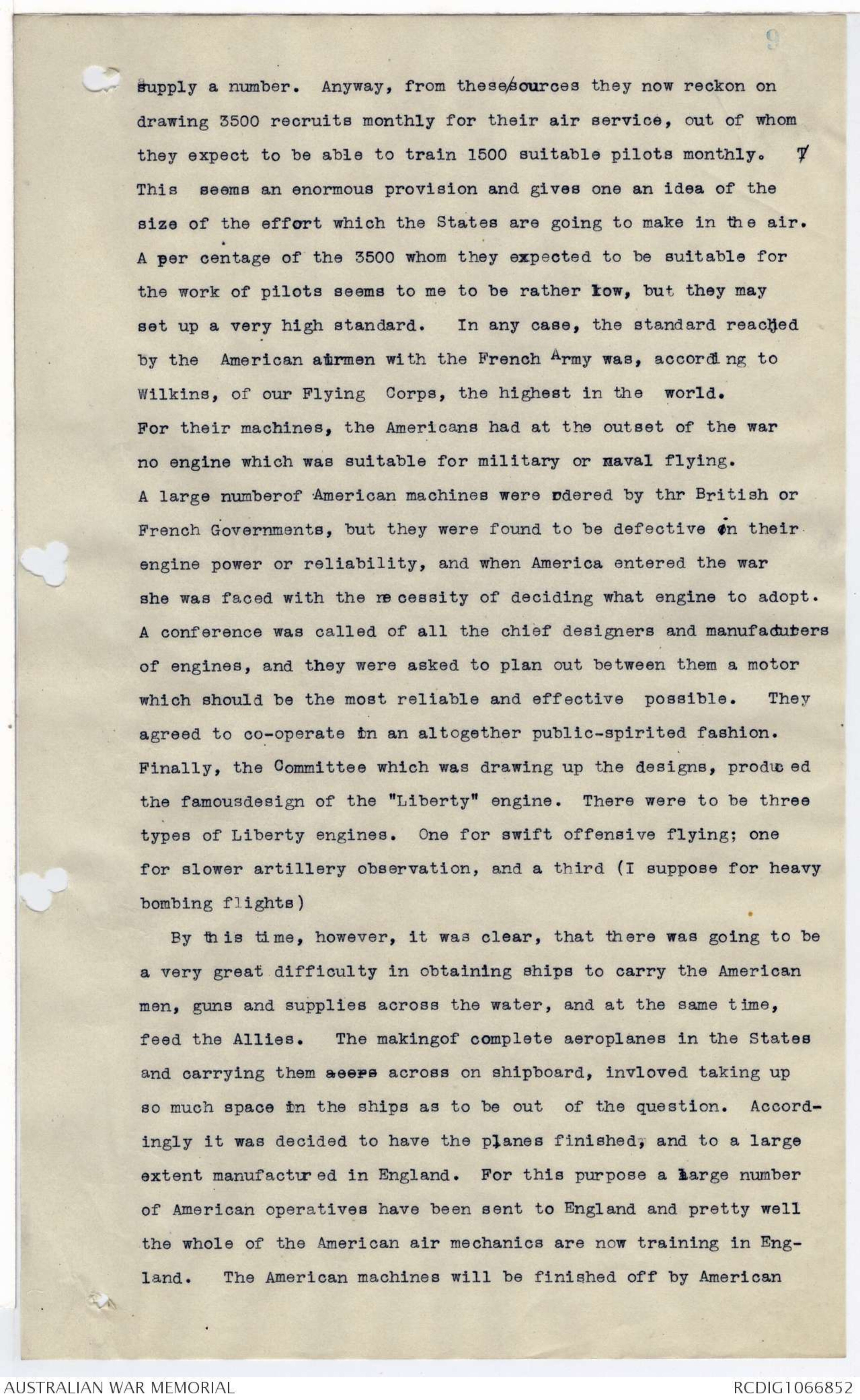
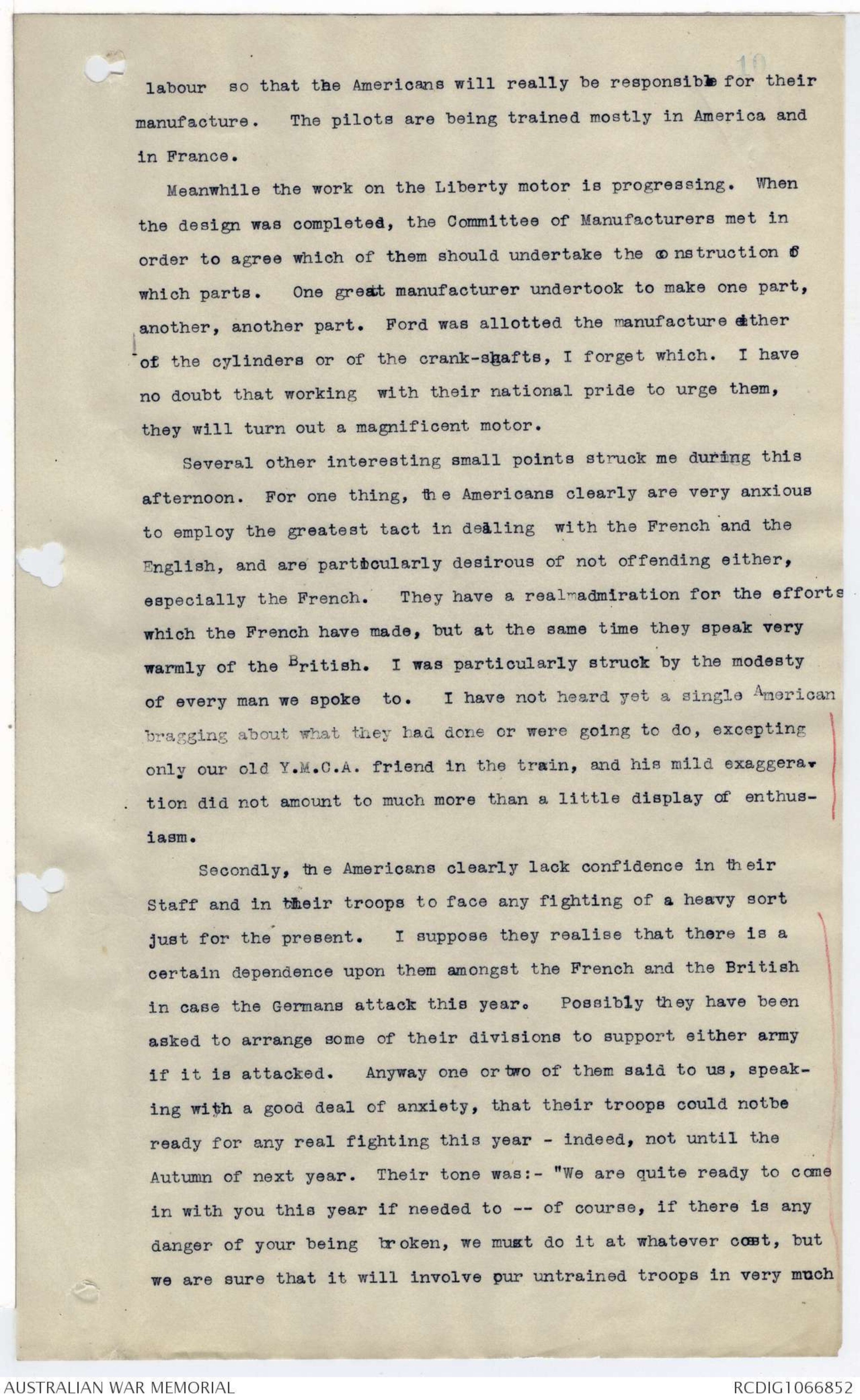
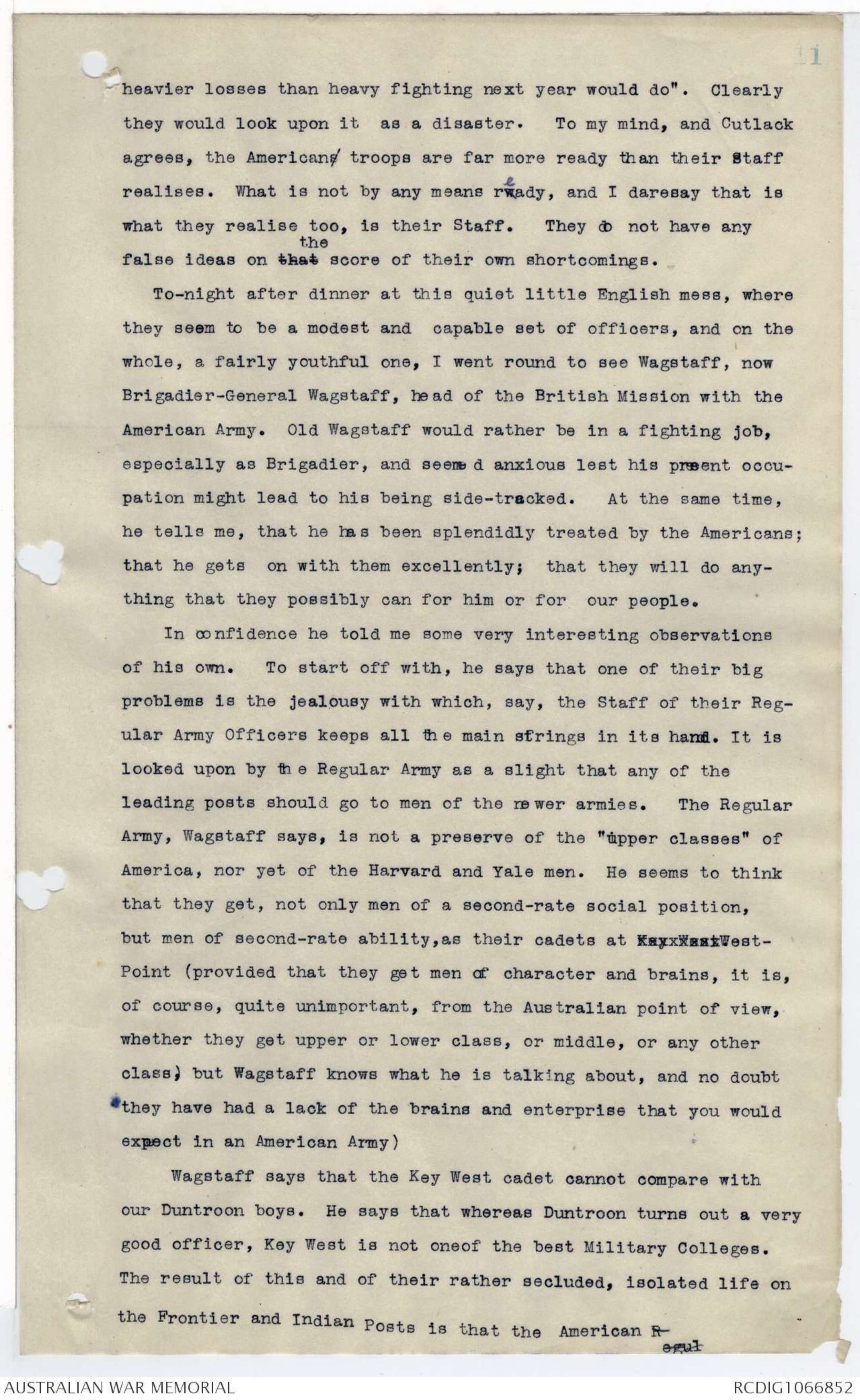
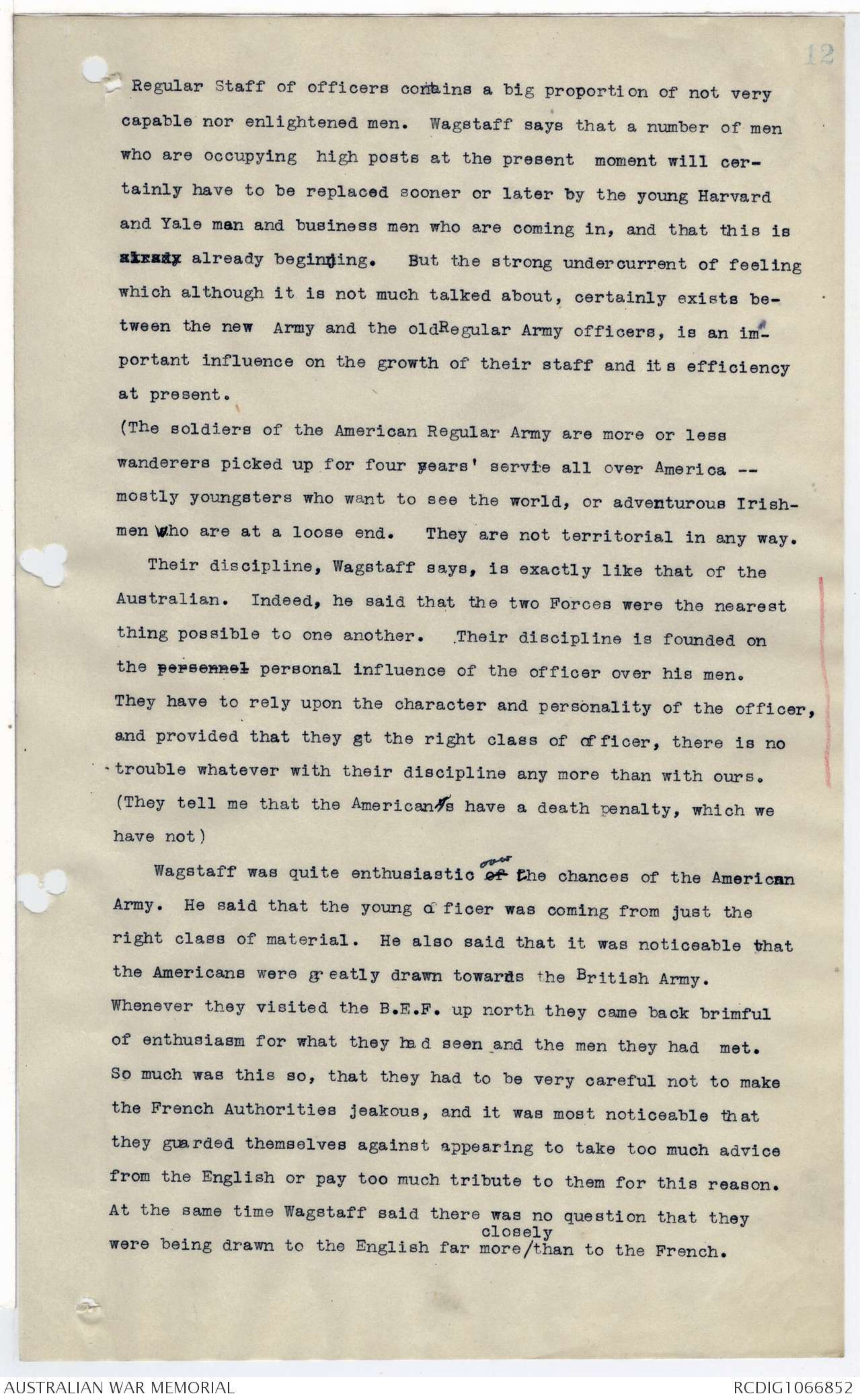
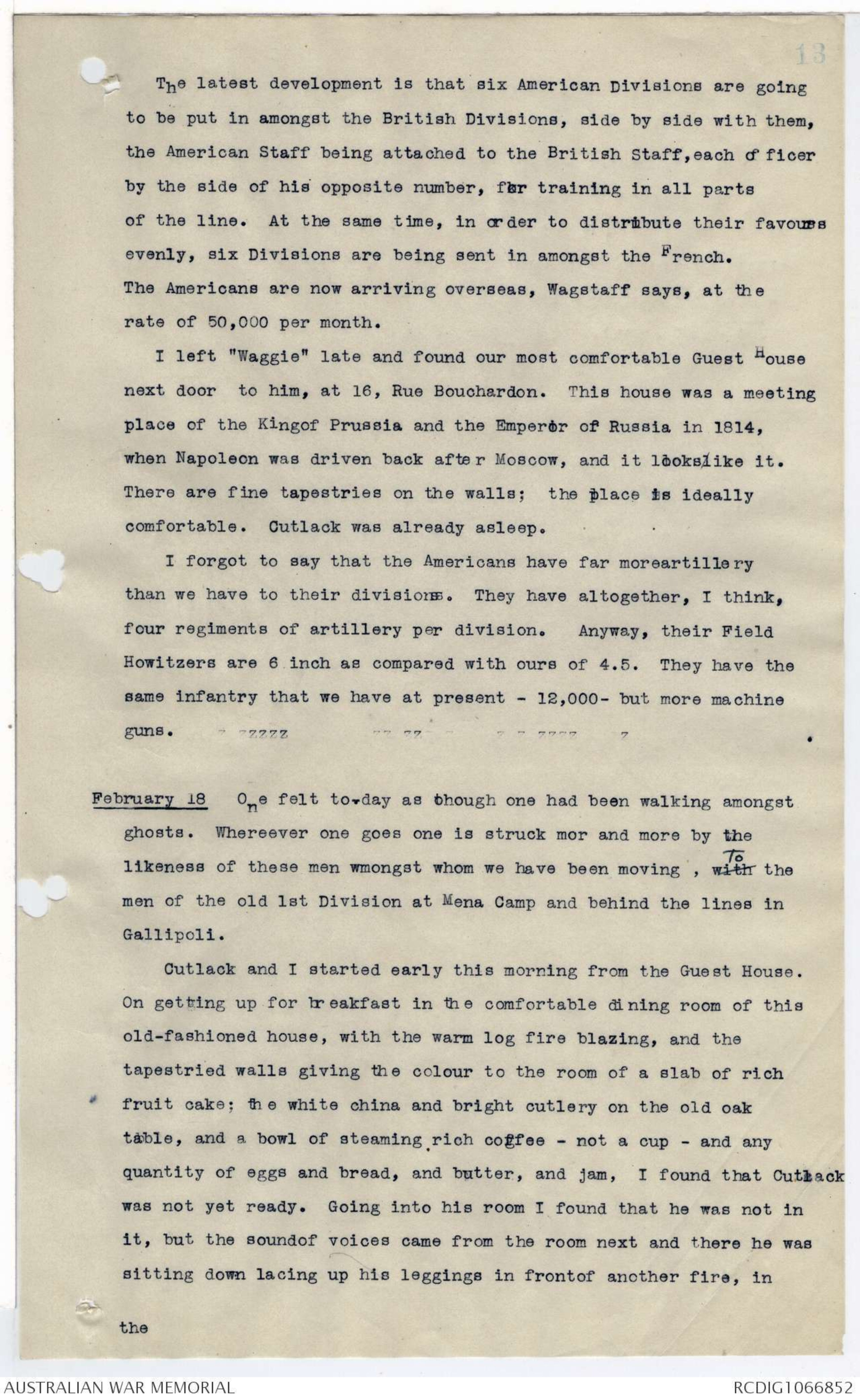
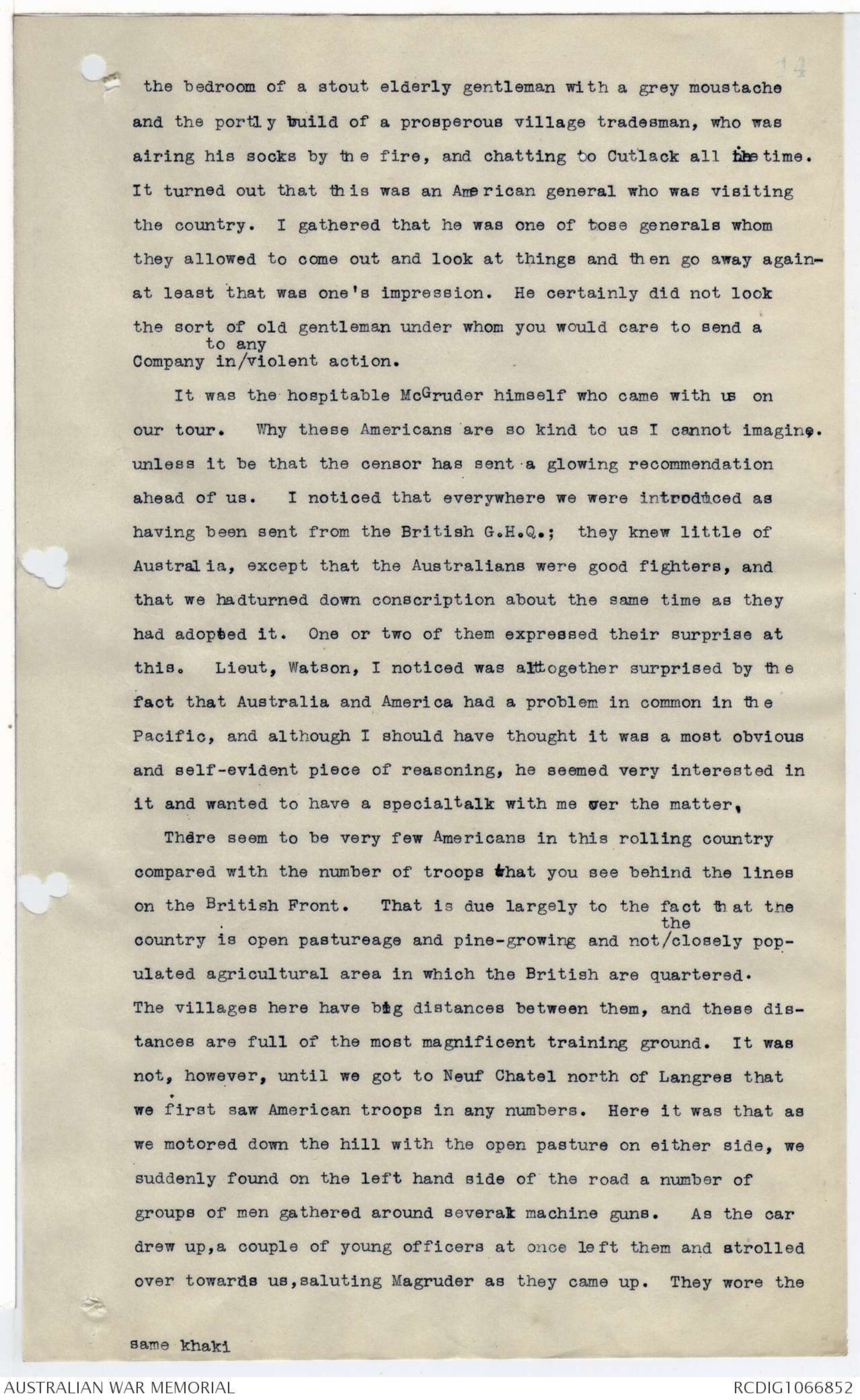
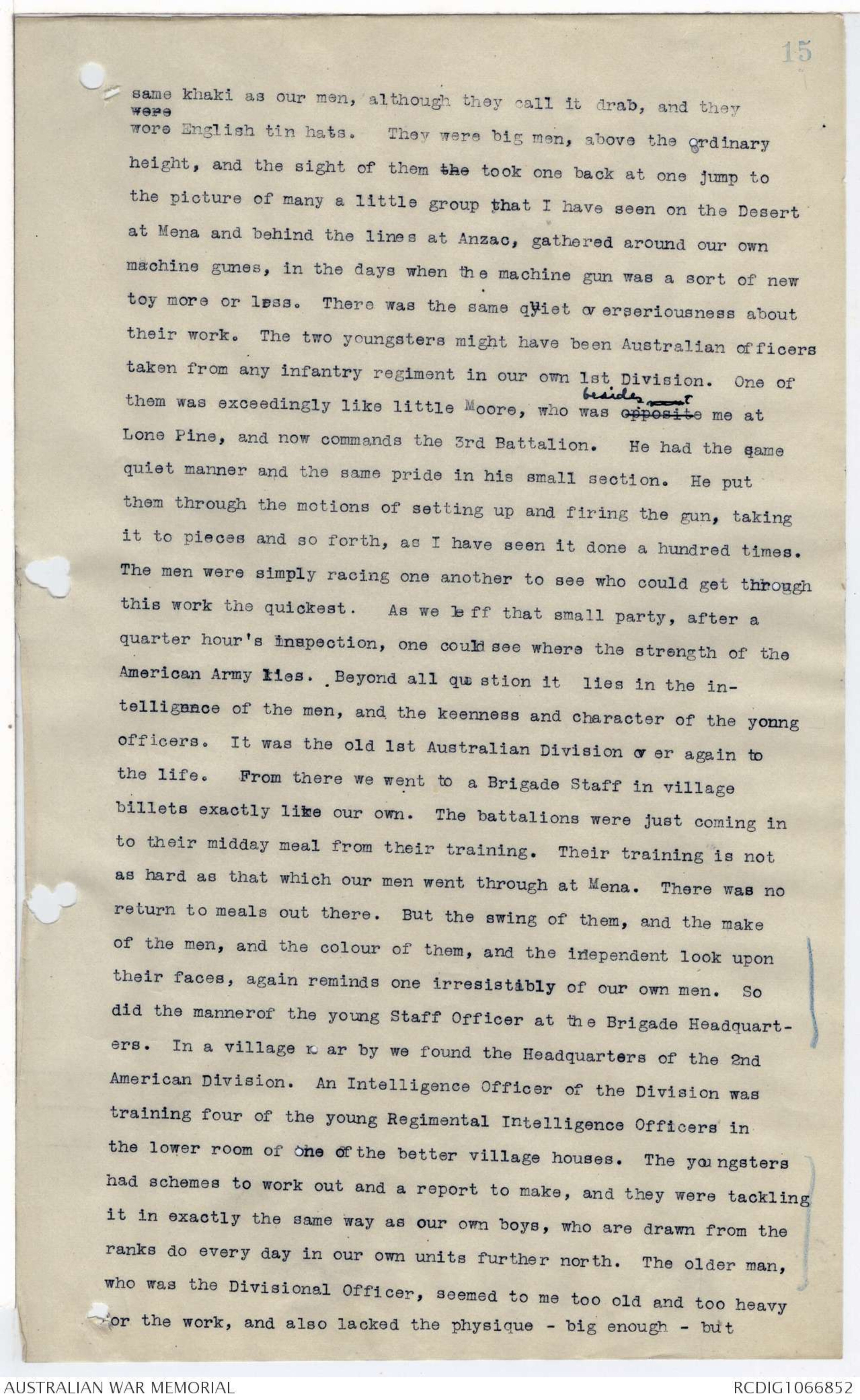
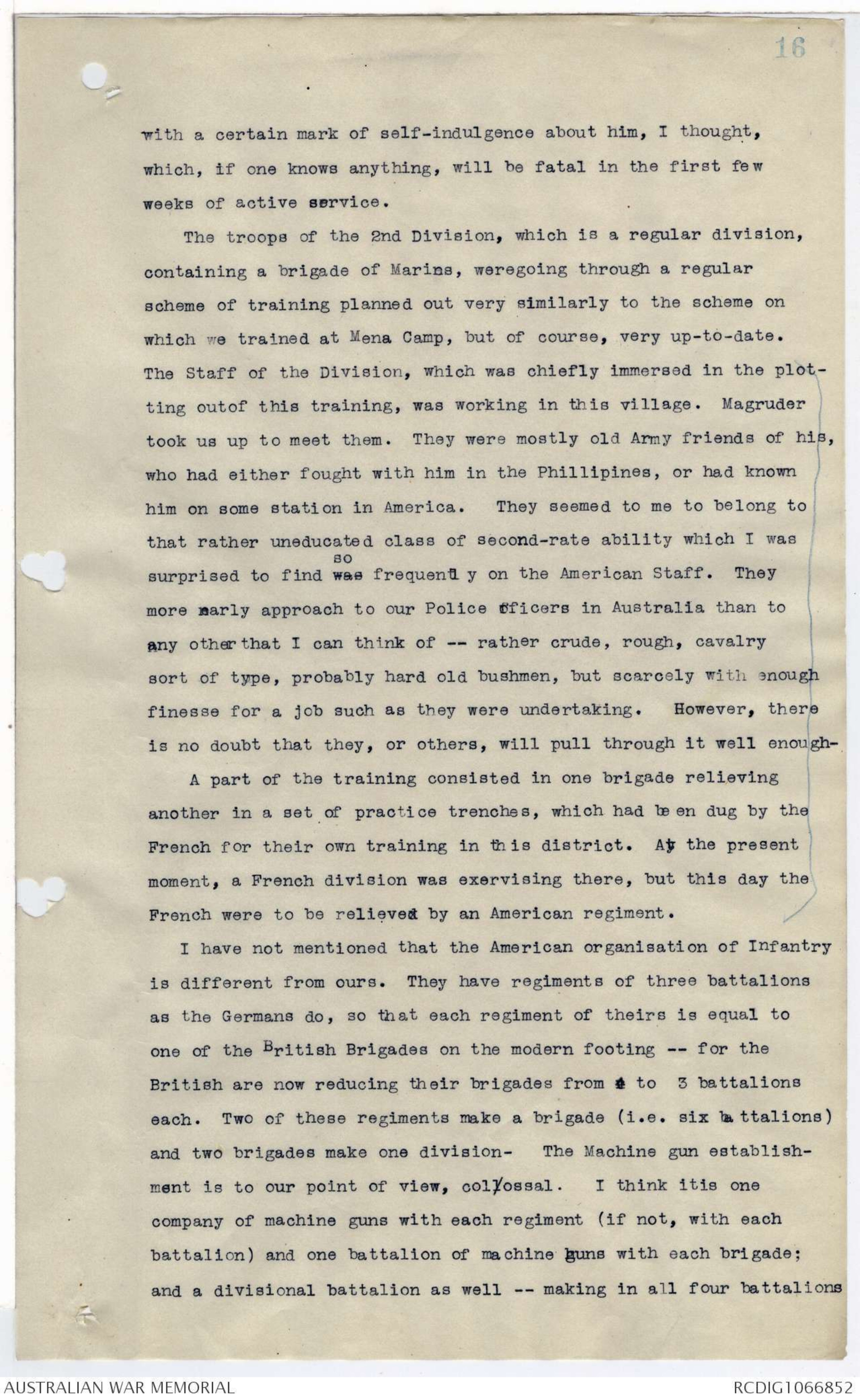
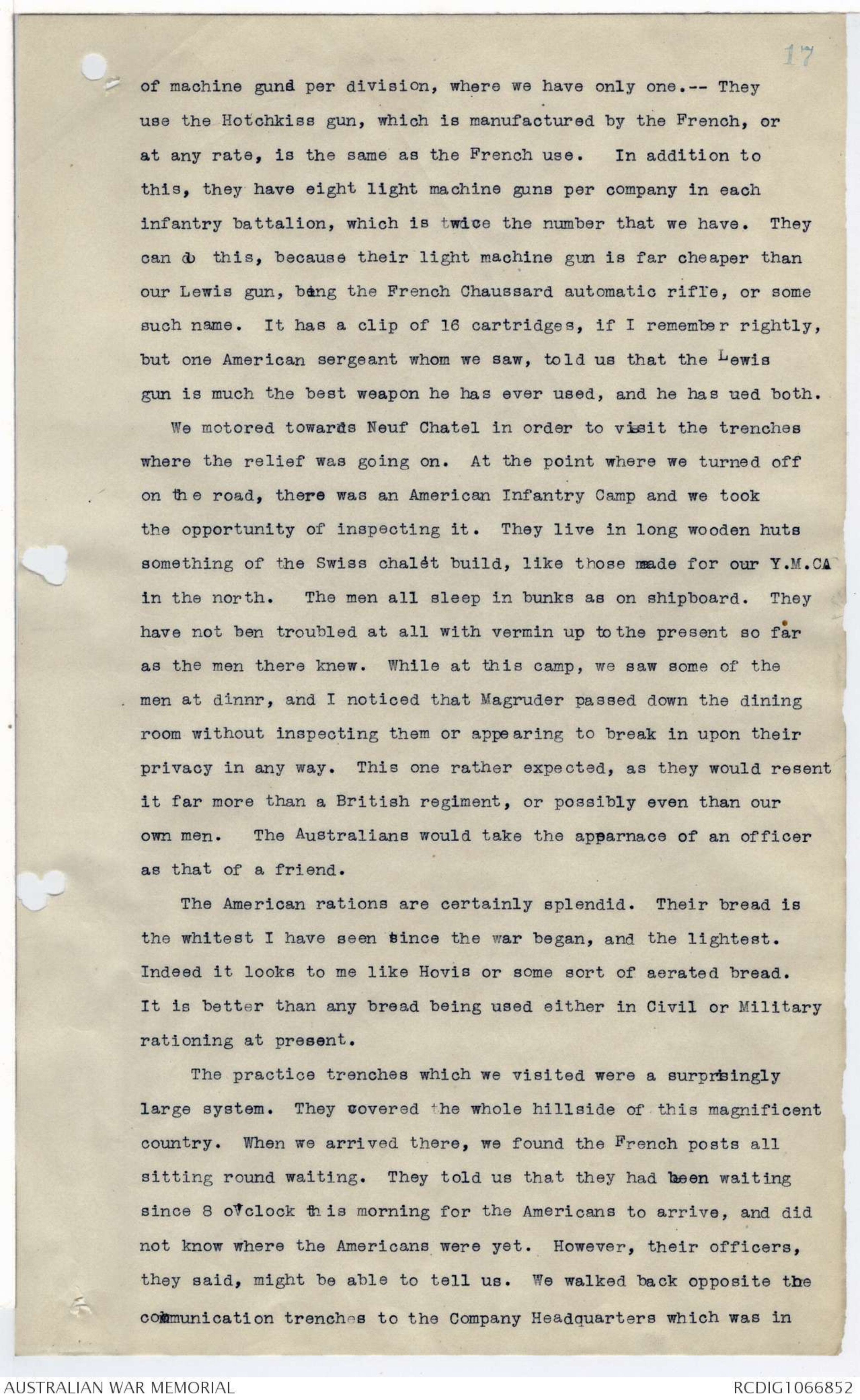
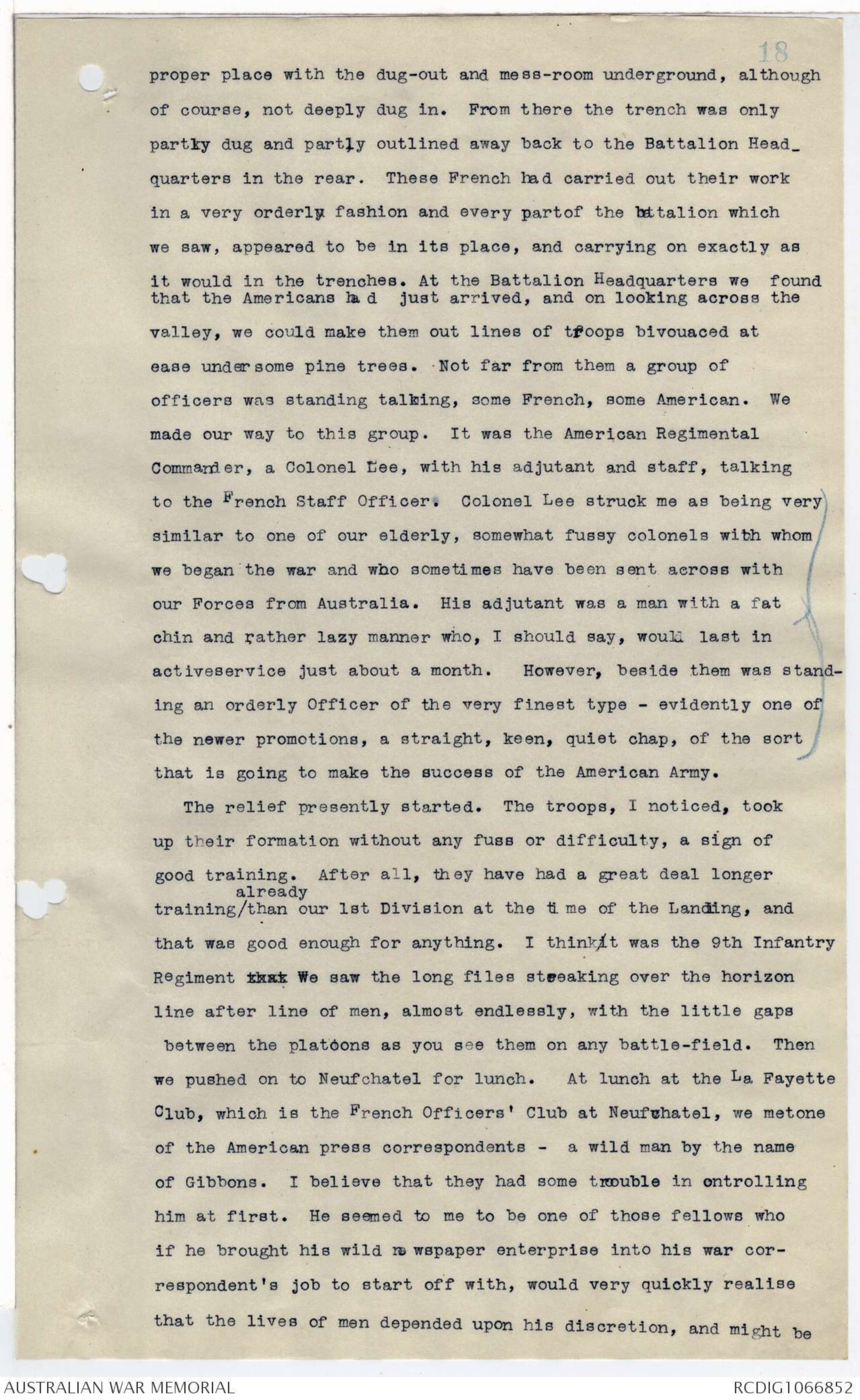
9
supply a number.Anyway, from these/sources they now reckon on
drawing 3500 recruits monthly for their air service, out of whom
they expect to be able to train 1500 suitable pilots monthly. T
This seems an enormous provision and gives one an idea of the
size of the effort which the States are going to make in the air.
A per centage of the 3500 whom they expected to be suitable for
the work of pilots seems to me to be rather low, but they may
set up a very high standard. In any case, the standard reached
by the American airmen with the French Army was, according to
Wilkins, of our Flying Corps, the highest in the world.
For their machines, the Americans had at the outset of the war
no engine which was suitable for military or naval flying.
A large numberof American machines were ordered by thr British or
French Governments, but they were found to be defective in their
engine power or reliability, and when America entered the war
she was faced with the ne cessity of deciding what engine to adopt.
A conference was called of all the chief designers and manufacturers
of engines, and they were asked to plan out between them a motor
which should be the most reliable and effective possible. They
agreed to co-operate in an altogether public-spirited fashion.
Finally, the Committee which was drawing up the designs, produc ed
the famousdesign of the "Liberty" engine. There were to be three
types of Liberty engines. One for swift offensive flying; one
for slower artillery observation, and a third (I suppose for heavy
bombing flights)
By this time, however, it was clear, that there was going to be
a very great difficulty in obtaining ships to carry the American
men, guns and supplies across the water, and at the same time,
feed the Allies. The makingof complete aeroplanes in the States
and carrying them acos across on shipboard, invloved taking up
so much space in the ships as to be out of the question. Accordingly
it was decided to have the planes finished, and to a large
extent manufactured in England. For this purpose a large number
of American operatives have been sent to England and pretty well
the whole of the American air mechanics are now training in England.
The American machines will be finished off by American
10
labour so that the Americans will really be responsible for their
manufacture. The pilots are being trained mostly in America and
in France.
Meanwhile the work on the Liberty motor is progressing. When
the design was completed, the Committee of Manufacturers met in
order to agree which of them should undertake the construction of
which parts. One great manufacturer undertook to make one part,
another, another part. Ford was allotted the manufacture either
of the cylinders or of the crank-shafts, I forget which. I have
no doubt that working with their national pride to urge them,
they will turn out a magnificent motor.
Several other interesting small points struck me during this
afternoon. For one thing, the Americans clearly are very anxious
to employ the greatest tact in dealing with the French and the
English, and are particularly desirous of not offending either,
especially the French. They have a realmadmiration for the efforts
which the French have made, but at the same time they speak very
warmly of the British. I was particularly struck by the modesty
of every man we spoke to. I have not heard yet a single American
bragging about what they had done or were going to do, excepting
only our old Y.M.C.A. friend in the train, and his mild exaggeration
did not amount to much more than a little display of enthusiasm.
Secondly, the Americans clearly lack confidence in their
Staff and in their troops to face any fighting of a heavy sort
just for the present. I suppose they realise that there is a
certain dependence upon them amongst the French and the British
in case the Germans attack this year. Possibly they have been
asked to arrange some of their divisions to support either army
if it is attacked. Anyway one or two of them said to us, speaking
with a good deal of anxiety, that their troops could notbe
ready for any real fighting this year - indeed, not until the
Autumn of next year. Their tone was:- "We are quite ready to come
in with you this year if needed to -- of course, if there is any
danger of your being broken, we must do it at whatever cost, but
we are sure that it will involve our untrained troops in very much
11
heavier losses than heavy fighting next year would do". Clearly
they would look upon it as a disaster. To my mind, and Cutlack
agrees, the Americans troops are far more ready than their Staff
realises. What is not by any means rewady, and I daresay that is
what they realise too, is their Staff. They do not have any
false ideas on that the score of their own shortcomings.
To-night after dinner at this quiet little English mess, where
they seem to be a modest and capable set of officers, and on the
whole, a fairly youthful one, I went round to see Wagstaff, now
Brigadier-General Wagstaff, head of the British Mission with the
American Army. Old Wagstaff would rather be in a fighting job,
especially as Brigadier, and seeme d anxious lest his present occupation
might lead to his being side-tracked. At the same time,
he tells me, that he has been splendidly treated by the Americans;
that he gets on with them excellently; that they will do anything
that they possibly can for him or for our people.
In confidence he told me some very interesting observations
of his own. To start off with, he says that one of their big
problems is the jealousy with which, say, the Staff of their Regular
Army Officers keeps all the main strings in its hand. It is
looked upon by the Regular Army as a slight that any of the
leading posts should go to men of the newer armies. The Regular
Army, Wagstaff says, is not a preserve of the "upper classes" of
America, nor yet of the Harvard and Yale men. He seems to think
that they get, not only men of a second-rate social position,
but men of second-rate ability,as their cadets at Key West West-Point
(provided that they get men of character and brains, it is,
of course, quite unimportant, from the Australian point of view,
whether they get upper or lower class, or middle, or any other
class) but Wagstaff knows what he is talking about, and no doubt
they have had a lack of the brains and enterprise that you would
expect in an American Army)
Wagstaff says that the Key West cadet cannot compare with
our Duntroon boys. He says that whereas Duntroon turns out a very
good officer, Key West is not oneof the best Military Colleges.
The result of this and of their rather secluded, isolated life on
the Frontier and Indian Posts is that the American Regul
12
Regular Staff of officers contains a big proportion of not very
capable nor enlightened men. Wagstaff says that a number of men
who are occupying high posts at the present moment will certainly
have to be replaced sooner or later by the young Harvard
and Yale men and business men who are coming in, and that this isalrady already beginning. But the strong undercurrent of feeling
which although it is not much talked about, certainly exists between
the new Army and the oldRegular Army officers, is an important
influence on the growth of their staff and it s efficiency
at present.
(The soldiers of the American Regular Army are more or less
wanderers picked up for four years' service all over America --
mostly youngsters who want to see the world, or adventurous Irish-men
who are at a loose end. They are not territorial in any way.
Their discipline, Wagstaff says, is exactly like that of the
Australian. Indeed, he said that the two Forces were the nearest
thing possible to one another. Their discipline is founded on
the personnel personal influence of the officer over his men.
They have to rely upon the character and personality of the officer,
and provided that they gt the right class of officer, there is no
-trouble whatever with their discipline any more than with ours.
(They tell me that the American's have a death penalty, which we
have not)
Wagstaff was quite enthusiastic of over the chances of the American
Army. He said that the young of ficer was coming from just the
right class of material. He also said that it was noticeable that
the Americans were greatly drawn towards the British Army.
Whenever they visited the B.E.F. up north they came back brimful
of enthusiasm for what they had seen and the men they had met.
So much was this so, that they had to be very careful not to make
the French Authorities jeakous, and it was most noticeable that
they guarded themselves against appearing to take too much advice
from the English or pay too much tribute to them for this reason.
At the same time Wagstaff said there was no question that they
were being drawn to the English far more ^ closely than to the French.
13
The latest development is that six American Divisions are going
to be put in amongst the British Divisions, side by side with them,
the American Staff being attached to the British Staff, each of ficer
by the side of his opposite number, for training in all parts
of the line. At the same time, in order to distribute their favours
evenly, six Divisions are being sent in amongst the French.
The Americans are now arriving overseas, Wagstaff says, at the
rate of 50,000 per month.
I left "Waggie" late and found our most comfortable Guest House
next door to him, at 16, Rue Bouchardon. This house was a meeting
place of the Kingof Prussia and the Emperor of Russia in 1814,
when Napoleon was driven back after Moscow, and it looks/like it.
There are fine tapestries on the walls; the place is ideally
comfortable. Cutlack was already asleep.
I forgot to say that the Americans have far moreartillery
than we have to their divisions. They have altogether, I think,
four regiments of artillery per division. Anyway, their Field
Howitzers are 6 inch as compared with ours of 4.5. They have the
same infantry that we have at present - 12,000- but more machine
guns.
February 18 One felt to-day as though one had been walking amongst
ghosts. Whereever one goes one is struck mor and more by the
likeness of these men wmongst whom we have been moving, with to the
men of the old 1st Division at Mena Camp and behind the lines in
Gallipoli.
Cutlack and I started early this morning from the Guest House.
On getting up for breakfast in the comfortable dining room of this
old-fashioned house, with the warm log fire blazing, and the
tapestried walls giving the colour to the room of a slab of rich
fruit cake; the white china and bright cutlery on the old oak
table, and a bowl of steaming rich coffee - not a cup - and any
quantity of eggs and bread, and butter, and jam, I found that Cutlack
was not yet ready. Going into his room I found that he was not in
it, but the soundof voices came from the room next and there he was
sitting down lacing up his leggings in frontof another fire, in
the
14
the bedroom of a stout elderly gentleman with a grey moustache
and the portly build of a prosperous village tradesman, who was
airing his socks by the fire, and chatting to Cutlack all the time.
It turned out that this was an American general who was visiting
the country. I gathered that he was one of tose generals whom
they allowed to come out and look at things and then go away again-
at least that was one's impression. He certainly did not look
the sort of old gentleman under whom you would care to send a
Company in ^ to any violent action.
It was the hospitable McGruder himself who came with us on
our tour. Why these Americans are so kind to us I cannot imagine.
unless it be that the censor has sent a glowing recommendation
ahead of us. I noticed that everywhere we were introduced as
having been sent from the British G.H.Q.; they knew little of
Australia, except that the Australians were good fighters, and
that we hadturned down conscription about the same time as they
had adopted it. One or two of them expressed their surprise at
this. Lieut, Watson, I noticed was altogether surprised by the
fact that Australia and America had a problem in common in the
Pacific, and although I should have thought it was a most obvious
and self-evident piece of reasoning, he seemed very interested in
it and wanted to have a specialtalk with me over the matter.
There seem to be very few Americans in this rolling country
compared with the number of troops that you see behind the lines
on the British Front. That is due largely to the fact that the
country is open pastureage and pine-growing and not ^ the closely populated
agricultural area in which the British are quartered.
The villages here have big distances between them, and these distances
are full of the most magnificent training ground. It was
not, however, until we got to Neuf Chatel north of Langres that
we first saw American troops in any numbers. Here it was that as
we motored down the hill with the open pasture on either side, we
suddenly found on the left hand side of the road a number of
groups of men gathered around several machine guns. As the car
drew up,a couple of young officers at once left them and strolled
over towards us,saluting Magruder as they came up. They wore the
same khaki
15
same khaki as our men, although they call it drab, and theywere wore English tin hats. They were big men, above the ordinary
height, and the sight of them the took one back at one jump to
the picture of many a little group that I have seen on the Desert
at Mena and behind the lines at Anzac, gathered around our own
machine gunes, in the days when the machine gun was a sort of new
toy more or less. There was the same quiet ov erseriousness about
their work. The two youngsters might have been Australian officers
taken from any infantry regiment in our own 1st Division. One of
them was exceedingly like little Moore, who was besides opposite next me at
Lone Pine, and now commands the 3rd Battalion. He had the same
quiet manner and the same pride in his small section. He put
them through the motions of setting up and firing the gun, taking
it to pieces and so forth, as I have seen it done a hundred times.
The men were simply racing one another to see who could get through
this work the quickest. As we leff that small party, after a
quarter hour's inspection, one could see where the strength of the
American Army lies. Beyond all que stion it lies in the intelligence
of the men, and the keenness and character of the young
officers. It was the old 1st Australian Division ov er again to
the life. From there we went to a Brigade Staff in village
billets exactly like our own. The battalions were just coming in
to their midday meal from their training. Their training is not
as hard as that which our men went through at Mena. There was no
return to meals out there. But the swing of them, and the make
of the men, and the colour of them, and the independent look upon
their faces, again reminds one irresistibly of our own men. So
did the mannerof the young Staff Officer at the Brigade Headquarters.
In a village [[near?]] by we found the Headquarters of the 2nd
American Division. An Intelligence Officer of the Division was
training four of the young Regimental Intelligence Officers in
the lower room of one of the better village houses. The youngsters
had schemes to work out and a report to make, and they were tackling
it in exactly the same way as our own boys, who are drawn from the
ranks do every day in our own units further north. The older man,
who was the Divisional Officer, seemed to me too old and too heavy
[[for?]] the work, and also lacked the physique - big enough - but
16
with a certain mark of self-indulgence about him, I thought,
which, if one knows anything, will be fatal in the first few
weeks of active service.
The troops of the 2nd Division, which is a regular division,
containing a brigade of Marins, weregoing through a regular
scheme of training planned out very similarly to the scheme on
which we trained at Mena Camp, but of course, very up-to-date.
The Staff of the Division, which was chiefly immersed in the plotting
outof this training, was working in this village. Magruder
took us up to meet them. They were mostly old Army friends of his,
who had either fought with him in the Phillipines, or had known
him on some station in America. They seemed to me to belong to
that rather uneducated class of second-rate ability which I was
surprised to find was so frequentl y on the American Staff. They
more narly approach to our Police officers in Australia than to
any other that I can think of -- rather crude, rough, cavalry
sort of type, probably hard old bushmen, but scarcely with enough
finesse for a job such as they were undertaking. However, there
is no doubt that they, or others, will pull through it well enough-
A part of the training consisted in one brigade relieving
another in a set of practice trenches, which had been dug by the
French for their own training in this district. At the present
moment, a French division was exervising there, but this day the
French were to be relieved by an American regiment.
I have not mentioned that the American organisation of Infantry
is different from ours. They have regiments of three battalions
as the Germans do, so that each regiment of theirs is equal to
one of the British Brigades on the modern footing –- for the
British are now reducing their brigades from 4 to 3 battalions
each. Two of these regiments make a brigade (i.e. six battalions)
and two brigades make one division- The Machine gun establishment
is to our point of view, collossal. I think itis one
company of machine guns with each regiment (if not, with each
battalion) and one battalion of machine guns with each brigade;
and a divisional battalion as well –- making in all four battalions
17
of machine guns per division, where we have only one.-- They
use the Hotchkiss gun, which is manufactured by the French, or
at any rate, is the same as the French use. In addition to
this, they have eight light machine guns per company in each
infantry battalion, which is twice the number that we have. They
can do this, because their light machine gun is far cheaper than
our Lewis gun, being the French Chaussard automatic rifle, or some
such name. It has a clip of 16 cartridges, if I remember rightly,
but one American sergeant whom we saw, told us that the Lewis
gun is much the best weapon he has ever used, and he has ued both.
We motored towards Neuf Chatel in order to visit the trenches
where the relief was going on. At the point where we turned off
on the road, there was an American Infantry Camp and we took
the opportunity of inspecting it. They live in long wooden huts
something of the Swiss chalét build, like those made for our Y.M.CA
in the north. The men all sleep in bunks as on shipboard. They
have not ben troubled at all with vermin up to the present so far
as the men there knew. While at this camp, we saw some of the
men at dinnr, and I noticed that Magruder passed down the dining
room without inspecting them or appearing to break in upon their
privacy in any way. This one rather expected, as they would resent
it far more than a British regiment, or possibly even than our
own men. The Australians would take the apparnace of an officer
as that of a friend.
The American rations are certainly splendid. Their bread is
the whitest I have seen since the war began, and the lightest.
Indeed it looks to me like Hovis or some sort of aerated bread.
It is better than any bread being used either in Civil or Military
rationing at present.
The practice trenches which we visited were a surprisingly
large system. They covered the whole hillside of this magnificent
country. When we arrived there, we found the French posts all
sitting round waiting. They told us that they had been waiting
since 8 o'clock this morning for the Americans to arrive, and did
not know where the Americans were yet. However, their officers,
they said, might be able to tell us. We walked back opposite the
communication trenches to the Company Headquarters which was in
18
proper place with the dug-out and mess-room underground, although
of course, not deeply dug in. From there the trench was only
partly dug and partly outlined away back to the Battalion Headquarters
in the rear. These French had carried out their work
in a very orderly fashion and every partof the battalion which
we saw, appeared to be in its place, and carrying on exactly as
it would in the trenches. At the Battalion Headquarters we found
that the Americans had just arrived, and on looking across the
valley, we could make them out lines of troops bivouaced at
ease under some pine trees. Not far from them a group of
officers was standing talking, some French, some American. We
made our way to this group. It was the American Regimental
Commander, a Colonel Lee, with his adjutant and staff, talking
to the French Staff Officer. Colonel Lee struck me as being very
similar to one of our elderly, somewhat fussy colonels with whom
we began the war and who sometimes have been sent across with
our Forces from Australia. His adjutant was a man with a fat
chin and rather lazy manner who, I should say, would last in
activeservice just about a month. However, beside them was standing
an orderly Officer of the very finest type - evidently one of
the newer promotions, a straight, keen, quiet chap, of the sort
that is going to make the success of the American Army.
The relief presently started. The troops, I noticed, took
up their formation without any fuss or difficulty, a sign of
good training. After all, they have had a great deal longer
training ^ already than our 1st Division at the time of the Landing, and
that was good enough for anything. I think/it was the 9th Infantry
Regiment that We saw the long files streaking over the horizon
line after line of men, almost endlessly, with the little gaps
between the platoons as you see them on any battle-field. Then
we pushed on to Neufchatel for lunch. At lunch at the La Fayette
Club, which is the French Officers' Club at Neufchatel, we metone
of the American press correspondents - a wild man by the name
of Gibbons. I believe that they had some trouble in controlling
him at first. He seemed to me to be one of those fellows who
if he brought his wild newspaper enterprise into his war correspondent's
job to start off with, would very quickly realise
that the lives of men depended upon his discretion, and might be
 Arlene Baade
Arlene BaadeThis transcription item is now locked to you for editing. To release the lock either Save your changes or Cancel.
This lock will be automatically released after 60 minutes of inactivity.